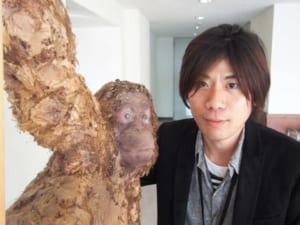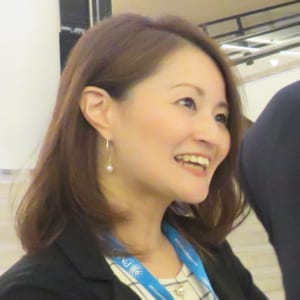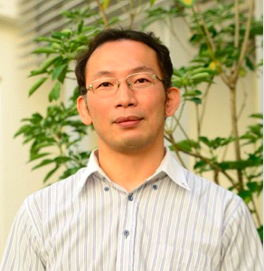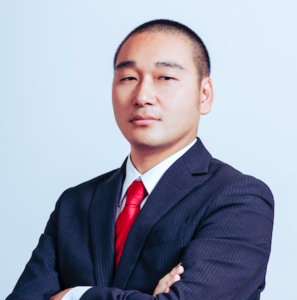A sense of challenge drives the hypothesis.
2019.12.24Session Report of the 8th Main Conference of the Association of Hyperdifferent Fields
Exploring the Origins of Knowledge - Can Crossing Disciplinary Barriers Generate Valuable Ideas [PART3].
Session Partner: Focus Systems, Inc.
<Speakers
 Assistant Professor, Department of Genome Evolution, Division of Genomic Cell Research, Primate Research Institute, Kyoto University
Assistant Professor, Department of Genome Evolution, Division of Genomic Cell Research, Primate Research Institute, Kyoto University
Mr. Masanori Imamura
Born in Takaoka City, Toyama Prefecture. Doctor of Medicine. After spending time as a student at the Faculty of Science, Kanazawa University, Nara Institute of Science and Technology, Graduate School of Medicine, Kyoto University, and Mitsubishi Chemical Life Science Institute, he worked as a Project Assistant Professor at Shiga University of Medical Science, Project Assistant Professor at Keio University School of Medicine, and a Visiting Researcher at RIKEN before assuming his current position in 2013. He has been working on human evolution and postnatal development from a stem cell perspective. He has received Life Technologies Japan Award (18th), On-Chip Biotechnologies Award (24th), SCREEN Holdings Award (29th), and L-RAD Award (36th) as the LIVERNESS Research Fund.
Laboratory websitehttp://www.pri.kyoto-u.ac.jp/sections/molecular_biology/member/imamura.html
 Associate Professor, Faculty of Education, Shiga University / Director, Eve Care Co.
Associate Professor, Faculty of Education, Shiga University / Director, Eve Care Co.
Masako Ohira
Completed the doctoral course at Osaka University Graduate School of Medicine in 2011. In the same year, he became a researcher at Nagaoka University of Technology's Center for the Development of Top Runners in the Fusion of Industry, Academia, and Government. He became a lecturer at the Faculty of Education, Shiga University in the same year and an associate professor at the same university in 2015. Since his graduate school days, he has been consistently engaged in research on stress evaluation using hormones in saliva. In recent years, he has been engaged in research and development of methodologies for stress assessment that do not use saliva, such as psychological stress assessment using biochemicals derived from body tissue fluid, nails, and hair. D. in Medicine.
 Project Associate Professor, Department of Tissue and Cell Design, Osaka University Graduate School of Medicine
Project Associate Professor, Department of Tissue and Cell Design, Osaka University Graduate School of Medicine
Technical Advisor, MyOrridge, Inc.
Mr. Kazunari Minami
D. in March 2003 from the Department of Neurophysiology, Division of Biophysics, Department of Biological Sciences, Faculty of Science, Kyoto University. He has developed low-cost and stable cell differentiation culture media and cell culture methods using novel compounds, and is conducting research and development for the mass production and stable supply of high-quality cardiomyocytes from iPS cells. Using this novel culture technology, he aims to lay the foundation for practical use of higher-order cellular tissues. 2016, he became a technical advisor to MyOridge, Inc. a bio-venture for mass culture of iPS cell-derived cardiomyocytes. 2017, he became a Project Associate Professor at Osaka University Graduate School of Medicine, Department of Collaborative Research in Tissue and Cell Design.
.
 Representative Director, President and COO, Liverness, Inc.
Representative Director, President and COO, Liverness, Inc.
Shuichiro Takahashi
D. (Life Sciences), Graduate School of Frontier Sciences, The University of Tokyo. He has been involved in RIVANESS since its establishment. After completing his graduate studies, he continued his research activities as a faculty member at the University of Tokyo, while at the same time he established a research institute at RIVANESS and built the foundation of its research and development business. He devised the business model of "Liberness Research Grant," a unique research grant, and "L-RAD," a database of unutilized research ideas, and has initiated many open innovation projects involving industry, academia, and education.
A sense of challenge drives the hypothesis.
(South)
I have always simply loved cell culture. Cells are a world that can only be seen through a microscope, and when I was a student, I enjoyed just looking at extremely complex cells stained with synapses and the like, and moving cells such as the optic nerve were a rarity. But that alone was not enough to get a job. I had a dream to artificially create organs using nerve cells, which would inevitably require a large number of cells. In the end, my limited research funds were rapidly being used to pay for culture media. As a result, they started to devise ways to reduce the cost of the culture medium. Then we found a compound, which became intellectual property, and we were able to provide cardiomyocytes to meet the needs of the market even with limited research funds. I then decided to use this to create a venture company, and to also work in the field of regenerative medicine. When I was asked what was the driving force behind the creation of these ideas and hypotheses, I thought it was an awareness of the issues.
(Takahashi)
I see. Strategically speaking, research on needs, awareness of issues, and the like may be more easily funded or understood. In that respect, Dr. Imamura, you changed your theme drastically. Wasn't there a need for it?
(Imamura)
Yes, it was. The change of research theme was based on my personal career and research strategy. In terms of my personal career, at the time, I had been working for a long time in a laboratory aiming at the practical application of regenerative medicine, which is of course very important and meaningful, but many people around the world are working toward the same goal. I wondered if the world would be any different if I were to disappear at this very moment. Probably not so much. If I were here, I think it would be a little faster, but even if I were not here, someone else in the world would be doing something similar in a different way. When I thought about my career in this context, I wondered how much meaning there would be for me to continue working as a researcher if I were not there.
(Takahashi)
I think the premise is that they want to leave their mark.
(Imamura)
That's right. In terms of research, I also felt that there is a limit to what can be learned about people by looking only at them. For example, research on human diseases often compares healthy people with patients, but the causes of diseases are rarely found. In fact, as discussed in "Science" and "Nature" a few years ago, diseases can be caused by a small environmental effect rather than a few genes. In other words, the difference between patients and healthy people is actually not that big. I believe that this is not the difference between healthy people and patients, but the difference between those who develop the disease and those who do not develop the disease. Therefore, if there is a third axis, that of non-onset disease, I think the true nature of people's illnesses will become clearer. In order to understand people, something other than people, but close to people, is necessary.
(Takahashi)
I see. Thank you very much. It makes a lot of sense to hear this kind of talk, but it's hard to reach this kind of background. However, I think there are many people who would like to communicate in this way. You mentioned earlier that you run around a lot, but is there anything that you keep in mind when you formulate a theme or hypothesis, and when you communicate it?
(Ohira)
Yes, that's right. To be honest, there was quite a strategy to survive as a researcher. I got my doctorate in medicine, but I am not a doctor, so I couldn't do it in medical school as a researcher. And even when I was in the engineering department, I was a bit of a newcomer, so I had a lack of confidence. In that respect, the field of the Faculty of Education, where I am currently enrolled, is quite easy for people involved in health to enter. In that sense, I chose it strategically, considering my career. I have been doing sleep research for about seven years, and I originally specialized in evaluating stress. I wanted to create a space where people can be healthy, but it is very much influenced by the state of consciousness. For example, when we present a fragrance that activates the parasympathetic nervous system and relaxes us, if we dislike the fragrance, our sympathetic nervous system will be activated and we will not be able to relax at all. When I thought about this, I thought that unconsciousness would have the most direct effect, and that's when I actually started my sleep research. So I thought that if I only looked at what I wanted to see in sleep research, I should just quit. However, as I continued, I learned more and more things, and that is why I continue to do it.
As I do when I think about my theme, looking back in the past, I myself was a student doing research in medical school and had not known the outside world for a long time. But, however, when I moved on to engineering and psychology, I realized that there were people doing the same kind of things. But all those people are doing it in their own way, not collaborating at all. As I ran around among them, I noticed that they were doing the same thing, but in slightly different ways and from different angles. If they are not doing it, I try to take the best of each and do something new. In this way, I am able to solve things that were thought to be impossible with surprising ease, or to do things that are considered commonplace in certain fields, but which, upon closer examination, have never been proven in any papers. I want to dig deeper into these areas as I create hypotheses.
(Takahashi)
I was reminded of something when I was listening to Ohira-sensei's talk. I will be releasing JapanResearch.com again, but actually, behind the scenes, you can see the human relationships. So, to put it another way, you can see the cliques of academics in one shot, but you can also get a timeline of how people were connected in 2010, 2011, 2012, etc. But if I made that public, I would really sink. But I think I'll be sunk if I make it public, so it's only visible from my computer. But there are interesting things that happen when I do that. For example, Mr. Ohira probably goes to various academic conferences. For example, Mr. Ohira probably goes to various academic societies and submits joint research projects with various people, saying, "Let's submit this kind of application. Each time you submit an application in this way, there are people who are from different academic cliques, or rather, people with different connections, who are able to come up with new themes. We can see such interesting people. Nowadays, when people in the industrial world try to collaborate with universities, they usually end up in trouble by searching for keywords on Google, and then going into the university with a question about the greatness of the professor. When you want to do something like industry-academia collaboration that takes a step forward into the beliefs and hypotheses of the professors, I wonder how the industrial world can approach such aspects as what type of person the professor is, what kind of thoughts he has, and what kind of habits of thought he has. Actually, I have an idea. Can I show it to you? Please comment.
What kind of idea is this? It's hard to go to a teacher to ask for confidential data or something, isn't it? You have to have a relationship of trust with the professor, and it is also difficult to sign a contract. But when you are in a laboratory, there are seminars or journal clubs where you can read the latest papers in a round-robin fashion, and there are opportunities for students to discuss what they are interested in in this field, or for the professors themselves to bring their own papers. The logic is that it is not confidential data, so it can be open, but it is done in seminar rooms at universities, so it is not accessible at all. However, the papers that are discussed in such a forum may be in the interests of the professor, and the discussion itself is not confidential information, so I think it is a fairly easy entry point to approach. Conversely, it is also an opportunity for teachers to explore the possibilities of working together with companies that come to such a meeting and see how they can work together. I think it would be great as a first screening before moving on to the next step, if the papers are read together with the public, or if they come in with some kind of contract or promise.
Is it okay for business people to go to the journal club? Or do you think it's pointless to do so, or that there will be problems like this, or that this kind of thing is necessary, or if you have any ideas like that, please let me know.But, Mr. Minami, do you have anything?

